Seven-in-ten or more Americans say that Democrats, Republicans, liberals and conservatives are at least somewhat comfortable to “freely and openly express their political views” in both their local communities and in the country overall. But there are key partisan differences in these feelings – particularly in views of the national political climate, with Republicans especially likely to believe there is a more stifling environment around speech for Republicans than for Democrats.
Overall, Americans are more likely to see Democrats as comfortable expressing their views in this country than to say this about Republicans. While about half of the public (48%) says that Democrats in this country are “very comfortable” to freely and openly express their political views, a smaller share (36%) says the same about Republicans.
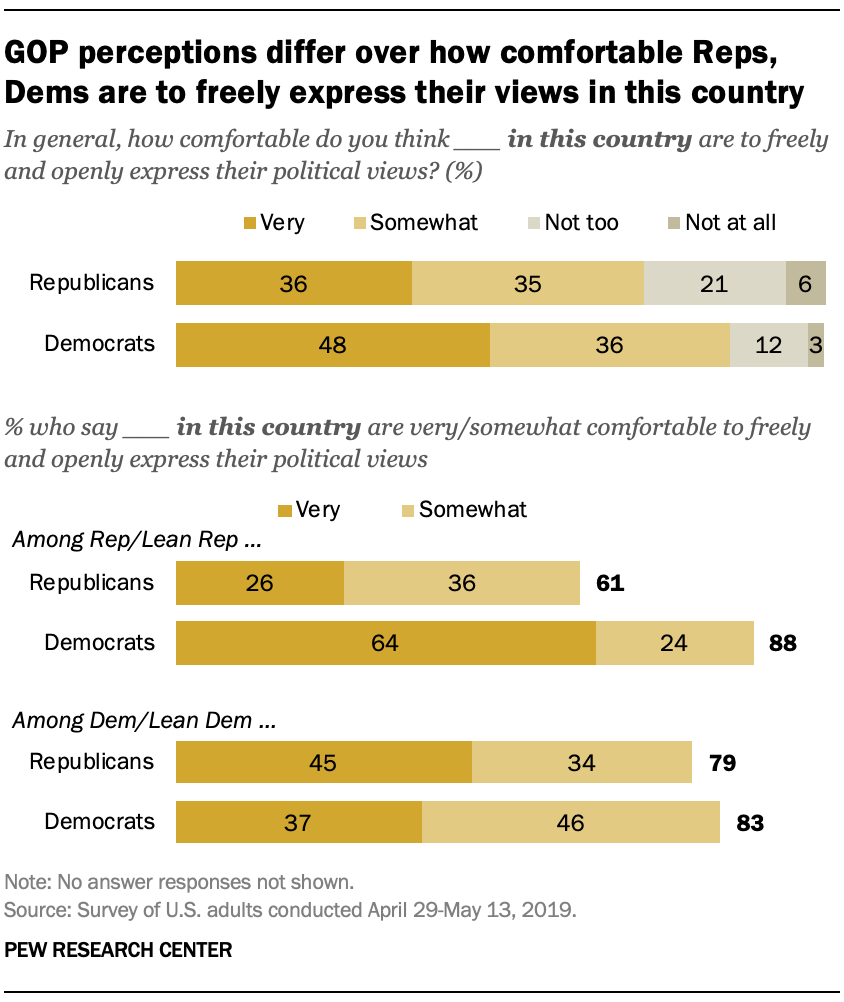 Republicans and Republican-leaning independents are especially likely to feel that Democrats and liberals are comfortable sharing their political views in this country – and also to feel that Republicans are not. Nearly nine-in-ten Republicans (88%) say Democrats are at least somewhat comfortable openly sharing their views, with 64% saying that Democrats in the country are “very comfortable” openly expressing their political views. By comparison, only about a quarter (26%) say Republicans in the country are very comfortable doing this (61% say Republicans are at least somewhat comfortable doing this).
Republicans and Republican-leaning independents are especially likely to feel that Democrats and liberals are comfortable sharing their political views in this country – and also to feel that Republicans are not. Nearly nine-in-ten Republicans (88%) say Democrats are at least somewhat comfortable openly sharing their views, with 64% saying that Democrats in the country are “very comfortable” openly expressing their political views. By comparison, only about a quarter (26%) say Republicans in the country are very comfortable doing this (61% say Republicans are at least somewhat comfortable doing this).
By comparison, there are only modest differences in Democratic perceptions of partisans’ comfort with political expression in the country. Roughly eight-in-ten Democrats say Republicans are at least somewhat comfortable freely and openly expressing their opinions in this country – roughly the same share as say this about Democrats (79% and 83%, respectively).
While Democrats are slightly more likely to describe Republicans than Democrats as very comfortable to freely express their views (45% vs. 37%), the 8 percentage point gap in these perceptions is considerably narrower than the 38 point gap in GOP perceptions.
There are similar patterns in beliefs about liberals’ and conservatives’ comfort expressing their political views in the country. Overall, 83% of Americans say liberals in this country are at least somewhat comfortable freely and openly expressing their views, while 71% say this about conservatives. Democrats are modestly more likely to say conservatives are more comfortable than liberals with expressing their views (85% vs. 79%, respectively). By contrast, about nine-in-ten Republicans (91%) say liberals are at least somewhat comfortable freely expressing their views in this country, while 56% say conservatives are at least somewhat comfortable doing this.
When asked about partisan groups in “your community,” roughly similar shares of Americans say Republicans (37%) and Democrats (40%) are very comfortable expressing their views.
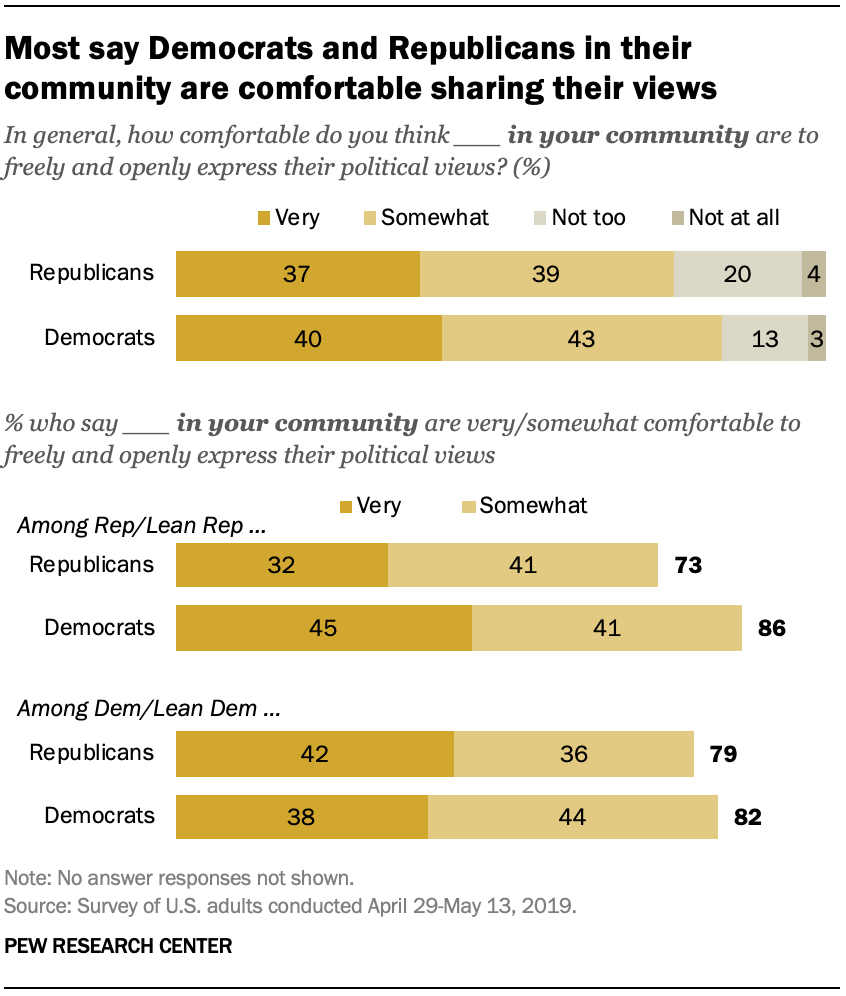 Democrats are about equally likely to say Republicans in their community and Democrats in their community are comfortable to freely and openly express their views: About eight-in-ten say both groups are somewhat comfortable doing this, including about four-in-ten saying they are very comfortable.
Democrats are about equally likely to say Republicans in their community and Democrats in their community are comfortable to freely and openly express their views: About eight-in-ten say both groups are somewhat comfortable doing this, including about four-in-ten saying they are very comfortable.
Republicans are more likely to say Democrats in their community are comfortable freely and openly expressing their political views than to say this about Republicans: 86% say Democrats are at least somewhat comfortable, while 73% say this about Republicans. However, this difference in perceptions about GOP comfort and Democratic comfort is considerably narrower at the community level than it is for the national environment.
How open people think their community is to Republicans and Democrats expressing their views depends on how red or blue it is
Perceptions of how comfortable partisans are expressing political views in their local communities vary by the political makeup of those communities. For example, 48% of adults who live in counties that Donald Trump carried by 10 points or more in the 2016 election say that Republicans in their local community are “very” comfortable expressing their political views; by contrast, just 30% of adults living in counties that Hillary Clinton won by similar margins say Republicans in their community are very comfortable freely and openly expressing their political views.
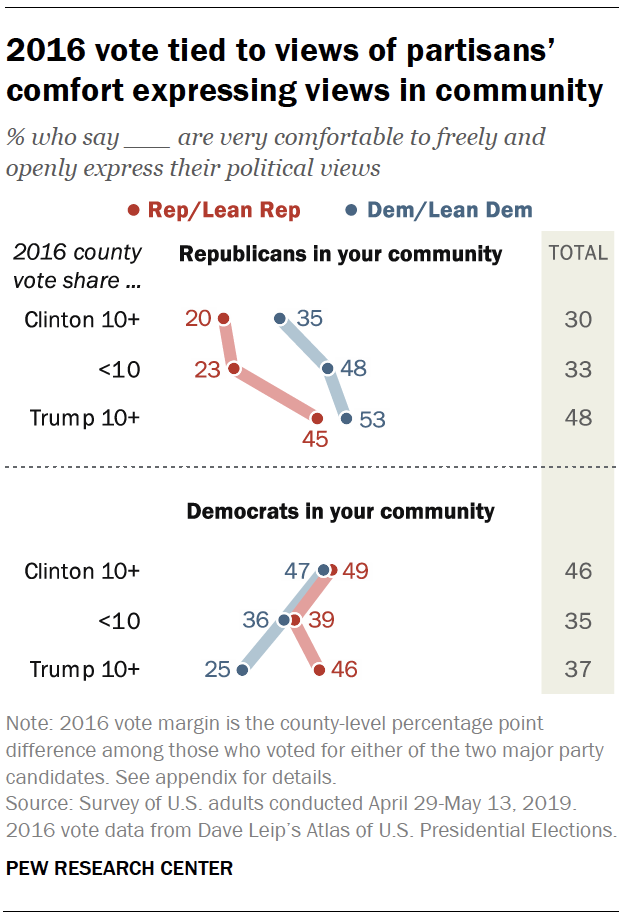 An opposite – though somewhat less pronounced – pattern is seen in views of Democrats’ comfort expressing their political views: 46% of adults living in counties that Clinton won by 10 points or more say Democrats in their communities are very comfortable expressing their political views; 37% of adults living in counties that Trump won by 10 or more points say this.
An opposite – though somewhat less pronounced – pattern is seen in views of Democrats’ comfort expressing their political views: 46% of adults living in counties that Clinton won by 10 points or more say Democrats in their communities are very comfortable expressing their political views; 37% of adults living in counties that Trump won by 10 or more points say this.
When it comes to Republicans’ comfort of political expression in their communities, both Democrats and Republicans see greater Republican comfort in counties Trump carried by 10 points or more than in counties where the election was closely contested or where Clinton won by at least 10 points.
This same dynamic is present in Democrats’ views of how comfortable Democrats in their communities are to freely and openly express their views (as the Clinton share of the 2016 vote rises, Democrats’ perceptions of the comfort Democrats feel expressing their views increases).
But Republican views of how comfortable Democrats are sharing their political views do not follow this pattern. About equal shares of Republicans who live in solid Clinton counties (49%) and solid Trump counties (46%) say they think Democrats in their community feel very comfortable sharing their political views.
Public sees a deterioration in the tone of national political debate
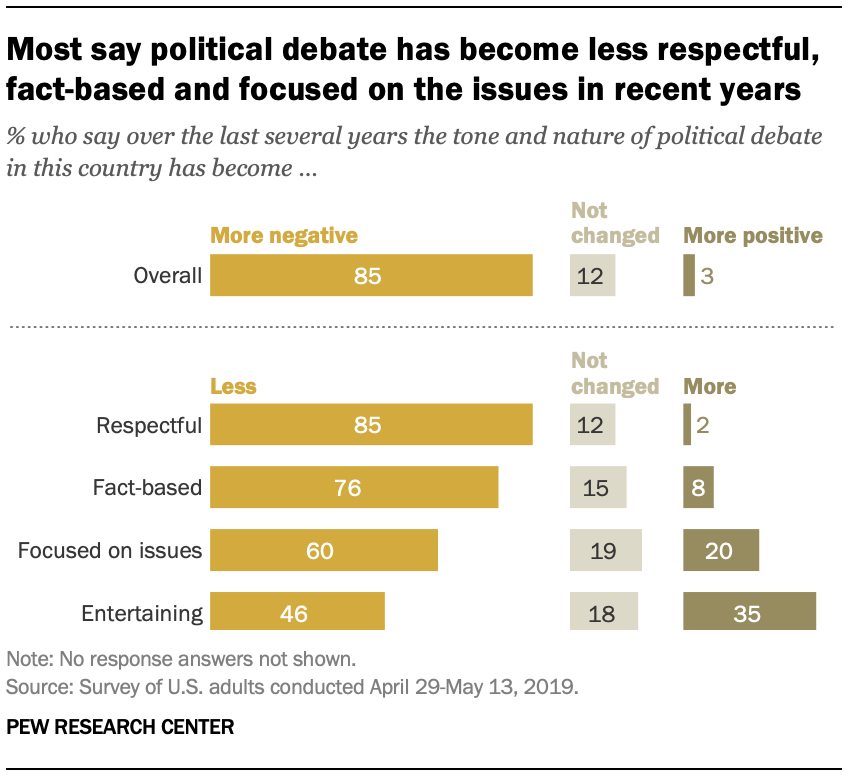
Overwhelming majorities of the public say that the tone and nature of political debate in the country has become more negative (85%), less respectful (85%) and less fact-based (76%) over the last several years. And six-in-ten say the debate has been less focused on issues than in the past.
Few Americans say there has been positive movement on any of these dimensions over the last several years – just 3% say the tone of national political debate has become more positive, while 2% say it has become more respectful, 8% say more fact-based and 20% say it has become more focused on issues.
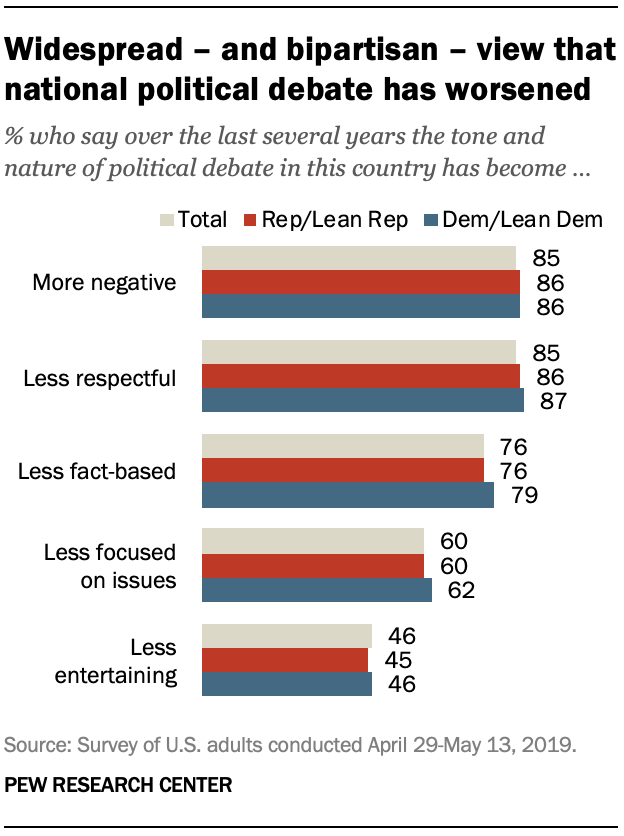
About a third of the public (35%) says that the tone of politics has become more entertaining in recent years. Still, nearly half (46%) say it has become less entertaining over this period.
Partisans offer similar evaluations of the current state of political debate in the country. For instance, 86% of both Republicans and Democrats say the tone of political debate has become more negative in recent years, while about six-in-ten in both groups say political debate has become less focused on issues (60% of Republicans, 62% of Democrats). Those who discuss politics more frequently – in both partisan groups – are somewhat more likely than others to view a decline in national political discourse.
Wide partisan differences in views of how open educational institutions, religious organizations are to a ‘wide range of opinions and viewpoints’
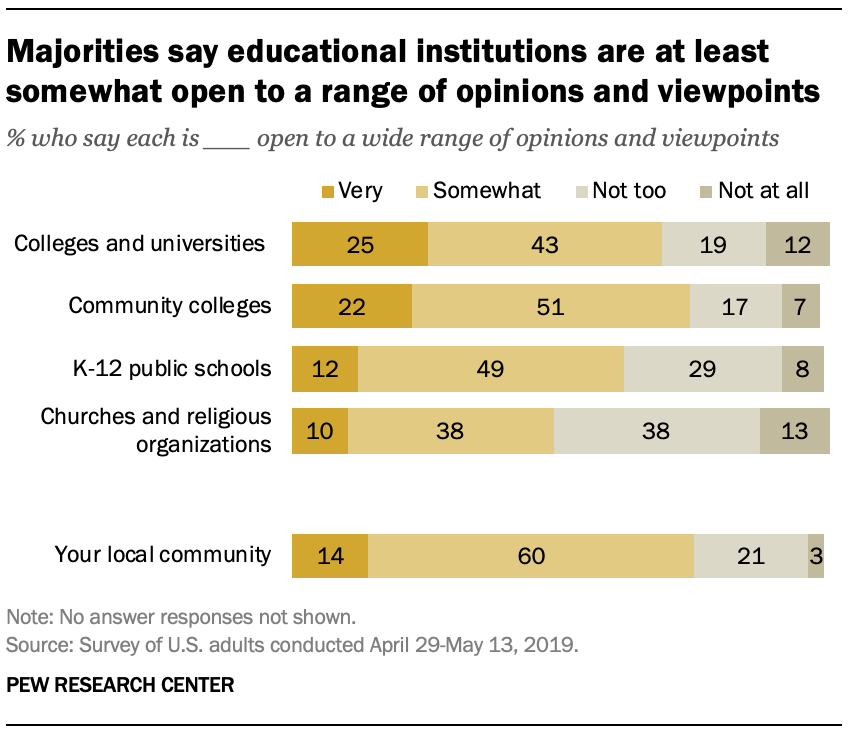 Roughly two-thirds of Americans (68%) say colleges and universities are very or somewhat open to “a wide range of opinions and viewpoints,” while a slightly larger majority (73%) say the same about community colleges. About six-in-ten (61%) view K-12 public schools as at least somewhat open to different views, while about half (48%) describe churches and religious organizations this way.
Roughly two-thirds of Americans (68%) say colleges and universities are very or somewhat open to “a wide range of opinions and viewpoints,” while a slightly larger majority (73%) say the same about community colleges. About six-in-ten (61%) view K-12 public schools as at least somewhat open to different views, while about half (48%) describe churches and religious organizations this way.
Three-quarters (75%) say their own local community is very or somewhat open to a wide range of opinions and viewpoints.
However, relatively small shares describe any of these places or institutions as “very” open – a quarter (25%) say this about colleges and universities, while roughly the same share (22%) says this about community colleges; 14% describe their own community this way. About one-in-ten say K-12 public schools (12%) and churches and religious organizations (10%) are very open to many different views.
There are wide partisan differences in these views – particularly in assessments of the openness of postsecondary educational institutions. Nearly nine-in-ten Democrats and Democratic-leaning independents (87%) describe colleges and universities as at least somewhat open to a wide range of opinions and viewpoints – including 34% who say these institutions are very open. By comparison, just 44% of Republicans and Republican leaners say colleges and universities are either very (15%) or somewhat (30%) open in this way (roughly a quarter say colleges and universities are “not at all” open to viewpoint diversity).
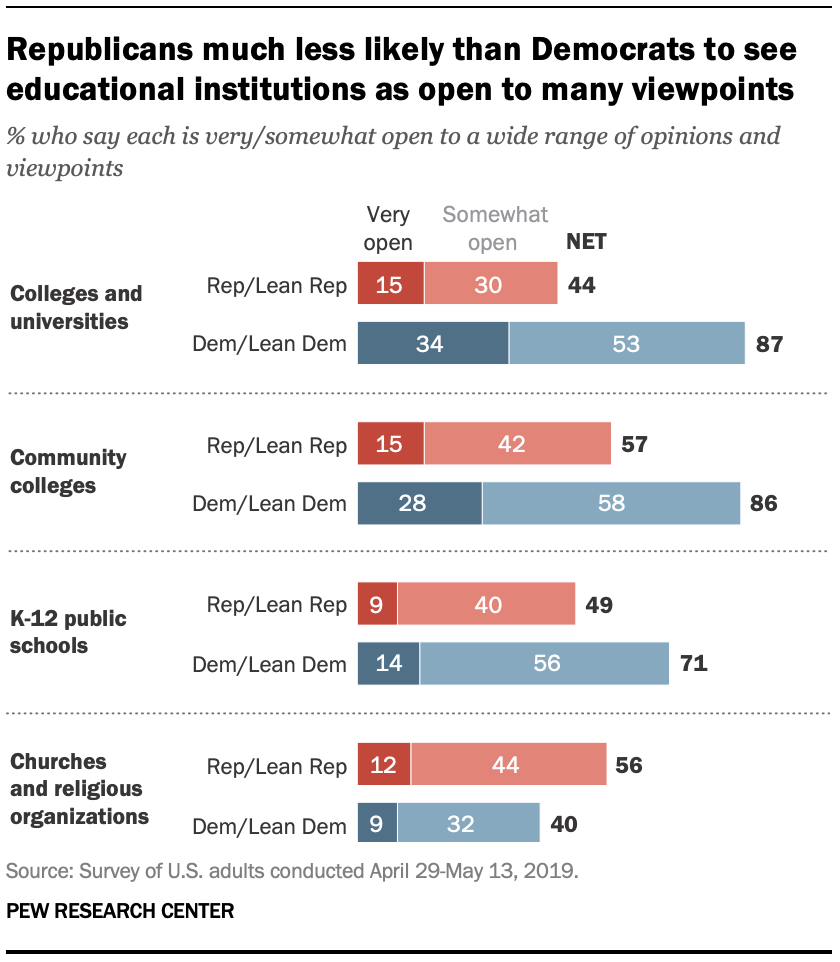 The partisan gap is smaller, though still substantial, in evaluations of community colleges. About six-in-ten Republicans (57%) say community colleges are very or somewhat open to many different opinions and viewpoints, while almost nine-in-ten Democrats (86%) say this.
The partisan gap is smaller, though still substantial, in evaluations of community colleges. About six-in-ten Republicans (57%) say community colleges are very or somewhat open to many different opinions and viewpoints, while almost nine-in-ten Democrats (86%) say this.
The partisan gap seen in assessments of educational institutions extends to views of primary and secondary public schools as well. While about seven-in-ten Democrats (71%) describe K-12 public schools as at least somewhat open to differences in opinions and viewpoints, roughly half of Republicans (49%) say the same.
In contrast, Republicans are more likely than Democrats to say churches and religious organizations are open to a range of opinions and viewpoints. A 56% majority of Republicans say this, compared with just 40% of Democrats.
When it comes to their local communities, partisans are in general agreement – about three-quarters of both Republicans (74%) and Democrats (75%) say their local communities are at least somewhat open to a wide range of opinions and viewpoints.
Overall, women (73%) are more likely than men (63%) to say colleges and universities are at least somewhat open. And while just 57% of Americans ages 65 and older say these institutions are at least somewhat open, fully seven-in-ten (71%) of Americans under 65 say this.
Most say social media companies should remove offensive content, but fewer are confident in them to determine what should be removed
Amid public debate about how social media companies should handle controversial content, about two-thirds of Americans (66%) say these companies have a responsibility to remove offensive content from their platforms; 32% say they do not have this responsibility.
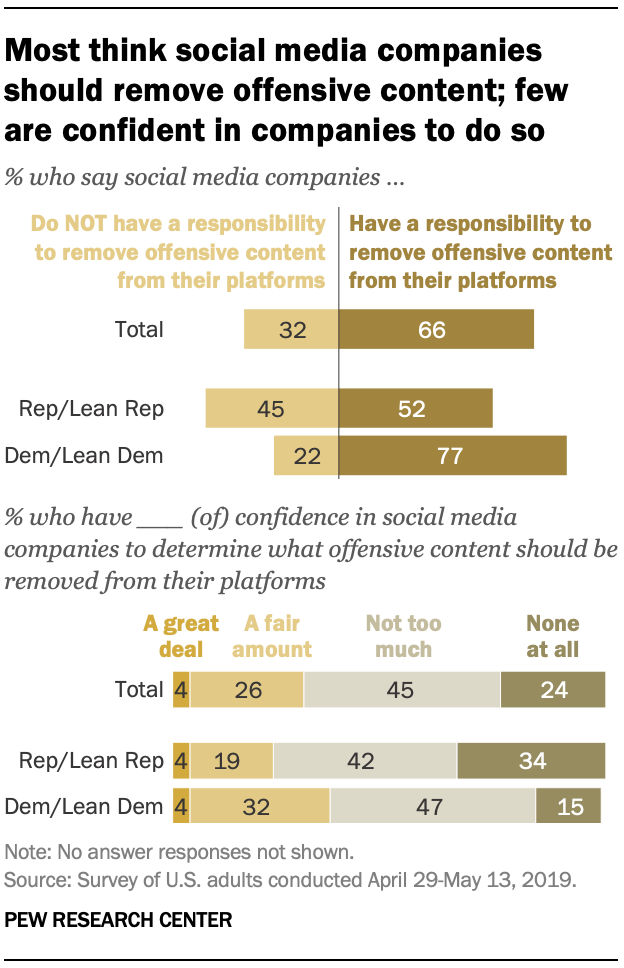 While majorities in both parties say social media companies should remove offensive content from their platforms, this view is more widely held by Democrats than Republicans: About three-quarters of Democrats (77%) say this, compared with 52% of Republicans and Republican leaners.
While majorities in both parties say social media companies should remove offensive content from their platforms, this view is more widely held by Democrats than Republicans: About three-quarters of Democrats (77%) say this, compared with 52% of Republicans and Republican leaners.
Yet the public does not have very much confidence in social media companies to determine what offensive content should be removed from their platforms.
About three-in-ten Americans (31%) have at least a fair amount of confidence in social media companies to decide which content to remove – including just 4% who say they have a great deal of confidence in these companies to do this.
Among Republicans, 23% have confidence in social media companies to determine what content should be removed; far greater shares say they have not too much (42%) or no confidence at all (34%) in companies to make this determination.
Democrats also largely lack confidence in social media companies to determine what content should be removed, though they are somewhat more likely than Republicans to express at least a fair amount of confidence (37%).
While majorities across demographic groups say social media companies have a responsibility to remove offensive content from their platforms, there remain gender, age and racial differences in the shares who express this view.
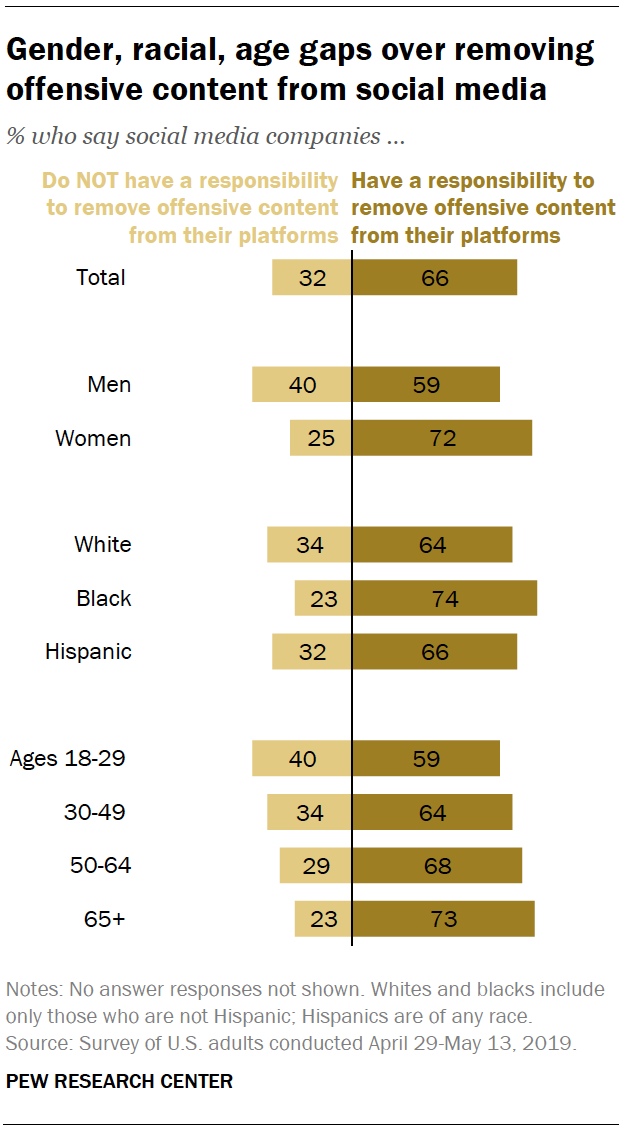 Overall, women (72%) are more likely than men (59%) to say social media companies have this responsibility, and gender differences are in evident in both parties.
Overall, women (72%) are more likely than men (59%) to say social media companies have this responsibility, and gender differences are in evident in both parties.
About six-in-ten Republican women (62%) say this, compared with about four-in-ten Republican men (43%). And Democratic women (79%) are modestly more likely than Democratic men (73%) to say social media companies have this responsibility.
Blacks (74%) are more likely than whites (64%) and Hispanics (66%) to say social media companies should remove offensive content.
Older adults are also more likely than younger adults to say companies have this responsibility: About seven-in-ten of those older than 65 (73%) say social media companies should remove such content; by comparison, 59% of 18- to 29-year-olds say this.
Women – who are more likely than men to say social media companies should remove offensive content – also have more confidence than men in these companies’ abilities to determine what content should be removed. Overall, 36% of women, compared with 25% of men, say they have at least a fair amount of confidence in companies to do this.
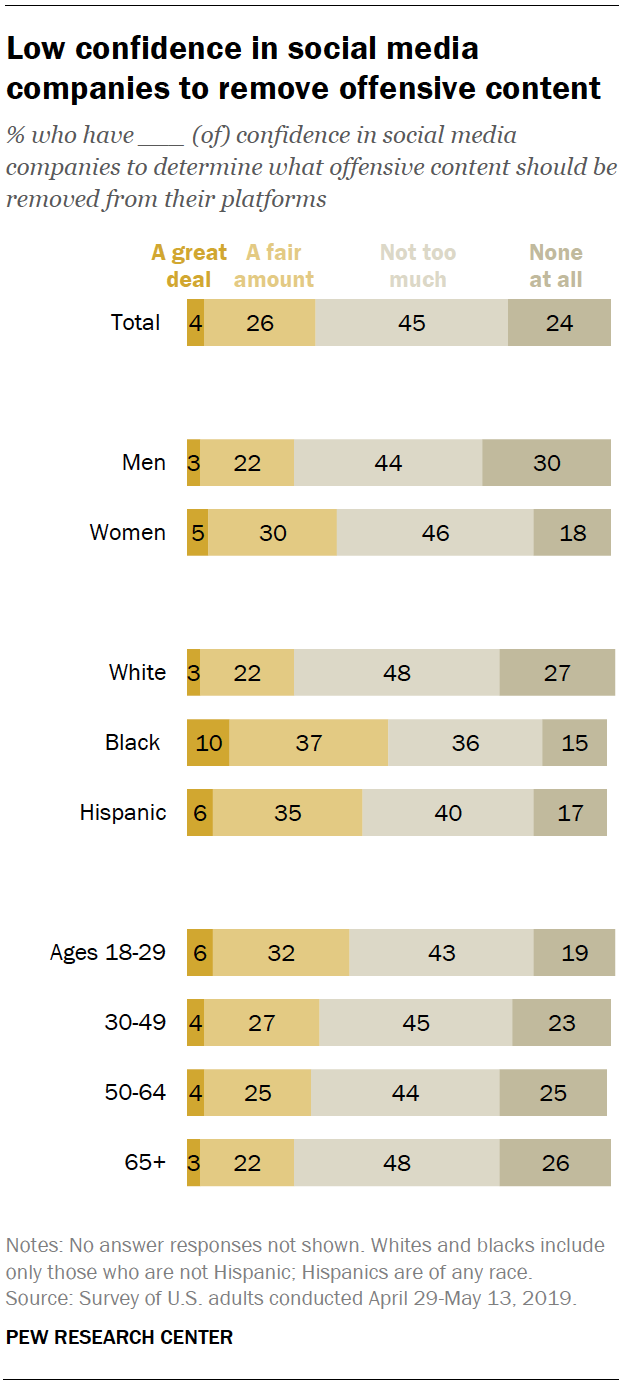 About half (48%) of black people express at least a fair amount of confidence in social media companies to determine what content should be removed, compared with just a quarter of whites. Four-in-ten Hispanics say they have at least a fair amount of confidence in companies to make this determination.
About half (48%) of black people express at least a fair amount of confidence in social media companies to determine what content should be removed, compared with just a quarter of whites. Four-in-ten Hispanics say they have at least a fair amount of confidence in companies to make this determination.
Although the youngest Americans are less likely than the oldest Americans to say social media companies have a responsibility to remove offensive content, they have more confidence than older Americans in these companies’ abilities to determine what content should be removed. Nearly four-in-ten 18- to 29-year-olds (38%) have a fair amount or great deal of confidence in social media companies to determine what content should be removed from their platforms, compared with just 24% of those ages 65 and older.
Those who find it important for them personally to use language that other people do not find offensive are more likely to say that social media companies have a responsibility to remove offensive content from their platforms.
Among those who say it is very important for them personally to use language that doesn’t offend others, about three-quarters (77%) say social media companies are responsible for removing offensive content.
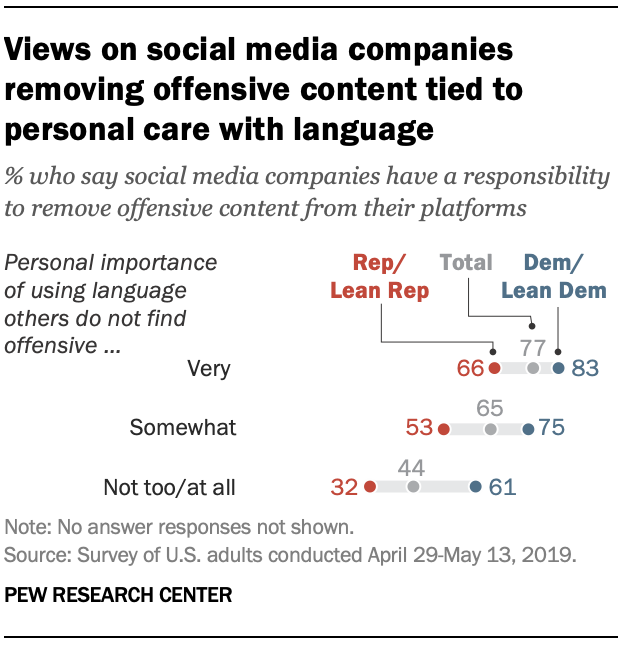 But among Americans who say it is not too or not at all important for them personally to use inoffensive language, fewer than half (44%) say social media companies have this responsibility.
But among Americans who say it is not too or not at all important for them personally to use inoffensive language, fewer than half (44%) say social media companies have this responsibility.
The pattern holds within party, particularly among Republicans. Two-thirds of Republicans who say it is very important that they don’t offend others say social media companies should remove offensive content. By contrast, a much smaller share of Republicans (32%) who place lower importance on using inoffensive language say social media companies should remove such content.
Among Democrats, 83% of those who say it is very important that their language doesn’t offend others say social media companies have a responsibility to remove offensive content; a smaller majority (61%) of those who place little or no importance on using inoffensive language say the same.


 Views about the acceptability of political insults
Views about the acceptability of political insults Across the Table: Would you share your views of Trump over dinner?
Across the Table: Would you share your views of Trump over dinner?